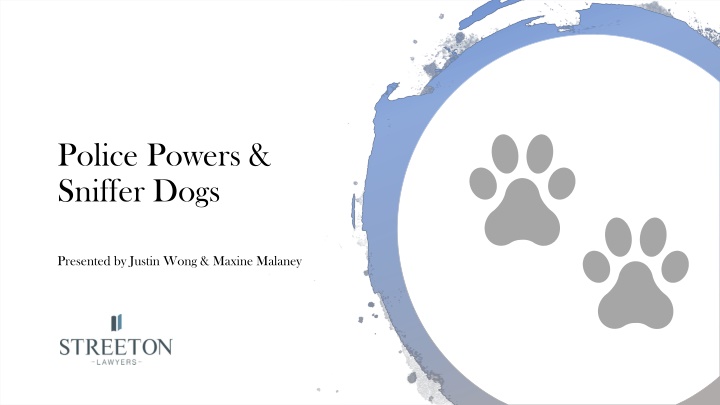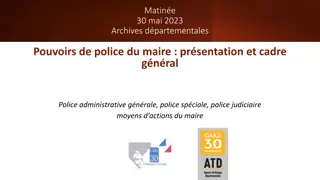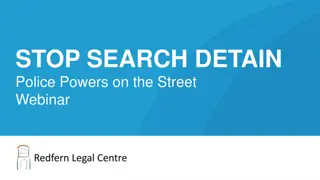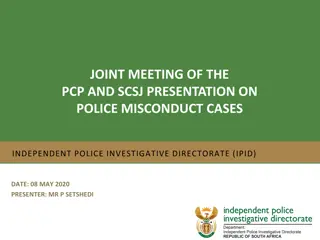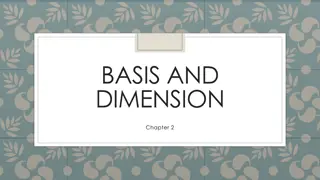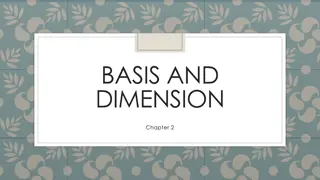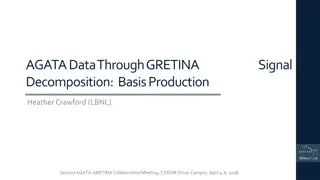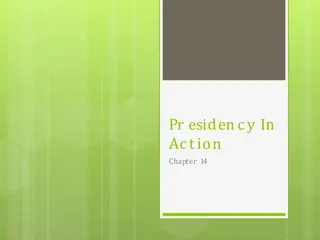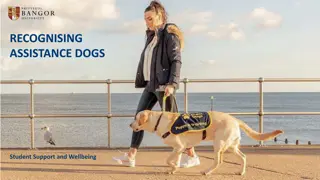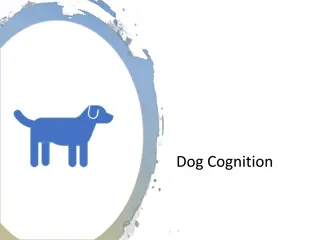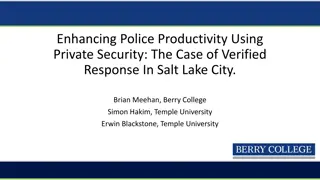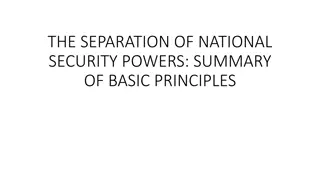Police Powers & Sniffer Dogs: Legislative Basis and Procedures
This presentation covers the legislative framework, case law, and operational procedures related to police powers and the use of sniffer dogs in detecting drug offences. It discusses the authority granted to police officers for search and detainment, the subjective and objective elements required for conducting searches, as well as the standard operating procedures for planned drug detection dog operations.
Download Presentation

Please find below an Image/Link to download the presentation.
The content on the website is provided AS IS for your information and personal use only. It may not be sold, licensed, or shared on other websites without obtaining consent from the author.If you encounter any issues during the download, it is possible that the publisher has removed the file from their server.
You are allowed to download the files provided on this website for personal or commercial use, subject to the condition that they are used lawfully. All files are the property of their respective owners.
The content on the website is provided AS IS for your information and personal use only. It may not be sold, licensed, or shared on other websites without obtaining consent from the author.
E N D
Presentation Transcript
Police Powers & Sniffer Dogs Presented by Justin Wong & Maxine Malaney
1. Legislative Basis and Caselaw LEPRA provisions Darby v DPP (2004) 61 NSWLR 558 2. Recent Developments/Effectiveness Outline 3. Evidence Act, Section 138 4. Questions
Power to Search Section 146 Section 146 Law Enforcement (Powers and Responsibilities) Act 2002 Law Enforcement (Powers and Responsibilities) Act 2002 (1)If a police officer is authorised to search a person for the purpose of detecting a drug offence, the officer is entitled to use a dog for that purpose. (2)A police officer is, for the purpose of detecting a drug offence, entitled to be accompanied by a dog under the officer's control if the officer is entitled to enter, or be in or on, particular premises in the exercise of the officer's functions.
Power to Search Section 21 Section 21 Law Enforcement (Powers and Responsibilities) Act 2002 Law Enforcement (Powers and Responsibilities) Act 2002 (1)A police officer may, without a warrant, stop, search and detain a person, and anything in the possession of or under the control of the person, if the police officer suspects on reasonable grounds that any of the following circumstances exists: (d) the person has in his or her possession or under his or her control, in contravention of the Drug Misuse and Trafficking Act 1985 , a prohibited plant or a prohibited drug.
Subjective element: state of mind must be formed by police officer who does search Objective element of test: reasonable grounds requires facts which are sufficient to induce that state of mind in a reasonable person Hyder v Commonwealth of Australia [2012] NSWCA 336 Must be some factual basis for the suspicion or belief Reasonable grounds must be judged against what was known or reasonably capable of being known at the relevant time
Standard Operating Procedures: Planned Drug Detection Dog Operations If the police officer suspects on reasonable grounds Police are again reminded that an indication given by a drug detection dog DOES NOT on its own provide police with the power to search, nor does it suffice for an officer to 'suspect on reasonable grounds' possession of a prohibited drug. investigating police need to make their own assessment. This can include observations, asking questions, intelligence received, etc, in an effort to build sufficient information to 'suspect on reasonable grounds .
Where can they search? Section 148 Section 148 Law Enforcement (Powers and Responsibilities) Act 2002 Law Enforcement (Powers and Responsibilities) Act 2002 (1) A police officer may, without a warrant, use a dog to carry out general drug detection in relation to the following persons: a) Premises being used for the consumption of liquor sold at the premises b) Public place where there is a sporting event, concert, dance party, parade c) Public passenger vehicle d) Premises authorized under the Tattoo Parlours Act 2012 e) Kings Cross precinct ` Section 149 Section 149 Law Enforcement (Powers and Responsibilities) Act 2002 Law Enforcement (Powers and Responsibilities) Act 2002 (2) A police officer who has reasonable grounds for believing that the persons at any public place may include persons committing drug offences may apply to an authorised officer for a warrant under this section.
Facts Darby charged with possession of ice and cannabis Waiting in line outside nightclub when approached by sniffer dog Dog was bunting and ferreting at pocket Darby v DPP (2004) 61 NSWLR 558 Issue Did actions of police dog amount to a search? If so, was search was illegal? Ipp JA, McColl JA agreeing Dog s actions did not amount to a search Important when reasonable suspicion was formed must be formed prior to search
2006 Ombudsman Review: 26% of searches revealed drugs 84% of drugs found were cannabis How effective are they? 2016 Police figures: 32% of searches revealed drugs Cost of $9,420,416.57 (average) per year from 2010-16
Exclusion of improperly or illegally obtained evidence (1) Evidence that was obtained: (a) improperly or in contravention of an Australian law, or Section 138 Evidence Act (b) in consequence of an impropriety or of a contravention of an Australian law, 1995 is not to be admitted unless the desirability of admitting the evidence outweighs the undesirability of admitting evidence that has been obtained in the way in which the evidence was obtained.
Evidence Act s 138 considerations Identify the nature of the impropriety or illegality Was there a proper indication by the dog? Did the searching officer have reasonable grounds other than the dog indication to suspect that the accused was in possession of a prohibited drug? Evidence "obtained and seriousness of offence
